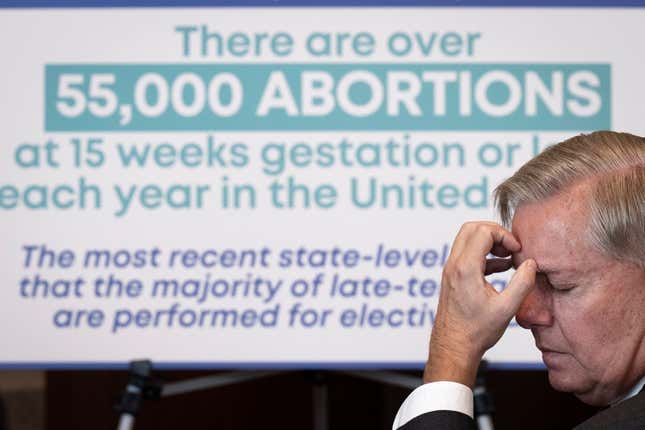Republicans Can’t Seem to Agree on What to Do About Abortion
Ignore it entirely? Rally around Lindsey Graham's 15-week ban? Listen to activists and ban it at fertilization? Are they screwed at the polls no matter what?
AbortionPolitics

As tens of thousands of Americans suffer from barriers to reproductive health in the wake of Roe v. Wade being overturned, Republicans are once again in disarray over the exact time in pregnancy at which they should be pushing to ban abortion. This is a change from how they spent the weekend—either not talking about a huge ruling in an abortion pill case or actively trying to change the subject on cable.
The New York Times reports that the chair of the Republican National Committee, Ronna Romney McDaniel, has been showing polling to party members that Americans largely support abortion up to 15 weeks. This appears to be an effort to rally conservatives around a 15-week ban introduced by Sen. Lindsay Graham (R-S.C.), as state politicians push increasingly extreme bans. (I must note that it’s unclear what polling McDaniel is citing and whether it was conducted before or after the Dobbs decision, but in reality, two-thirds of Americans think abortion should be legal in most or all cases—and even 15-week bans are an extreme, dangerous violation of the rights of women and pregnant people.)
Some of the worst people we know have noted that the survival of the party is at stake. Rep. Nancy Mace (R-S.C.), who’s been (unsuccessfully) attempting to get her party to moderate its views on abortion, was quoted in the Times piece as saying that if Republicans “keep going down these rabbit holes of extremism, we’re just going to keep losing.” The Times reporter wrote in agreement with Mace that the “party’s activist base could be leading them over an electoral cliff next year.”
-

-

-

-

-

-

-

-

-

-

-

-

-

-

-

-

-

-

-

-

-

-

-

-

-

-

-

-

-

-

-

-

-

-

-

-

-

-

-

-








































